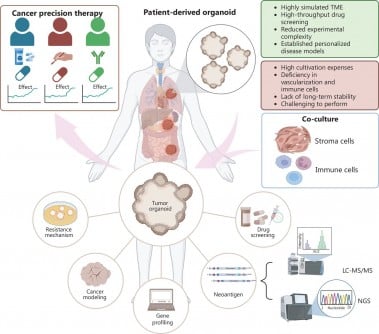Science
Organoids Revolutionize Cancer Research and Personalized Therapy

Researchers at Peking University People’s Hospital have unveiled significant advancements in cancer therapy through the use of organoids, as detailed in a new review published in Cancer Biology & Medicine. This innovative approach addresses long-standing challenges in cancer research by providing more accurate models of human tumors, which are crucial for developing personalized treatment strategies.
For years, scientists relied on simplified models that failed to capture the complexity of human cancers. Traditional flat cell cultures often lose genetic integrity and lack the necessary microenvironment, while animal models can be costly and biologically different from humans. These limitations have resulted in a substantial gap between laboratory findings and clinical application, contributing to high drug failure rates. Researchers have now turned to organoids to bridge this gap.
Organoids are three-dimensional structures cultivated from patient tumor tissues or stem cells, preserving the genetic mutations and microenvironments of the original tumors. This revolutionary model allows researchers to maintain tumor heterogeneity, which is vital for understanding patient-specific responses to therapies. For instance, studies in colorectal and gastric cancers have shown that drug response testing using organoids closely mirrors clinical outcomes.
Advancing Precision Medicine
The potential applications of organoid technology extend beyond chemotherapy. Co-culturing organoids with immune cells has emerged as a groundbreaking platform for studying therapies such as checkpoint inhibitors and CAR-T cell treatments. By linking laboratory findings directly to patient survival outcomes, these models offer a more realistic view of how patients might respond to various treatments.
Recent technological advancements further amplify the capabilities of organoid research. Microfluidic systems that simulate organoid-on-a-chip dynamics can mimic processes like metastasis. Additionally, techniques such as proteomics and single-cell sequencing are unveiling hidden signaling pathways within tumors, enhancing understanding of clonal diversity and tumor biology.
Importantly, organoids also play a critical role in vaccine development. They preserve tumor-specific features and allow for the simulation of immune responses in vitro, paving the way for personalized immune strategies that predict patient-specific responses.
Dr. Kezhong Chen, the senior author of the review, emphasized the transformative impact of organoids: “They allow us to study tumors as living ecosystems, capturing both genetic complexity and immune dynamics. This means we can test therapies in conditions far closer to reality and predict how individual patients might respond.”
Implications for Clinical Practice
The implications of organoid research extend from the laboratory to the clinic. Clinicians can utilize organoids to guide therapy choices, minimizing exposure to ineffective drugs and enhancing treatment efficacy. Researchers benefit from a robust platform to explore drug resistance and identify precise biomarkers, potentially accelerating the pace and reducing the costs of pharmaceutical development.
As organoids reduce reliance on animal testing, they streamline early-stage trials, making the drug development process more efficient. In the realm of vaccines, organoids stand ready to revolutionize how immune responses are tailored to individual patients.
Despite the promise of organoids, challenges remain, particularly in standardizing culture conditions and ensuring long-term stability. However, the potential for organoids to hasten the transition toward precision oncology is significant, offering hope for more effective and tailored cancer care.
This work was supported by multiple funding sources, including the Chinese Academy of Medical Sciences and the National Natural Science Foundation of China. As organoid research continues to evolve, it holds the promise of reshaping how cancer is understood and treated in the coming years.
-

 Lifestyle4 months ago
Lifestyle4 months agoLibraries Challenge Rising E-Book Costs Amid Growing Demand
-

 Sports3 months ago
Sports3 months agoTyreek Hill Responds to Tua Tagovailoa’s Comments on Team Dynamics
-

 Sports3 months ago
Sports3 months agoLiverpool Secures Agreement to Sign Young Striker Will Wright
-

 Lifestyle4 months ago
Lifestyle4 months agoSave Your Split Tomatoes: Expert Tips for Gardeners
-

 Lifestyle3 months ago
Lifestyle3 months agoPrincess Beatrice’s Daughter Athena Joins Siblings at London Parade
-

 World3 months ago
World3 months agoWinter Storms Lash New South Wales with Snow, Flood Risks
-

 Science4 months ago
Science4 months agoTrump Administration Moves to Repeal Key Climate Regulation
-

 Science3 months ago
Science3 months agoSan Francisco Hosts Unique Contest to Identify “Performative Males”
-

 Business4 months ago
Business4 months agoSoFi Technologies Shares Slip 2% Following Insider Stock Sale
-

 Science4 months ago
Science4 months agoNew Tool Reveals Link Between Horse Coat Condition and Parasites
-

 Sports4 months ago
Sports4 months agoElon Musk Sculpture Travels From Utah to Yosemite National Park
-

 Science4 months ago
Science4 months agoNew Study Confirms Humans Transported Stonehenge Bluestones









